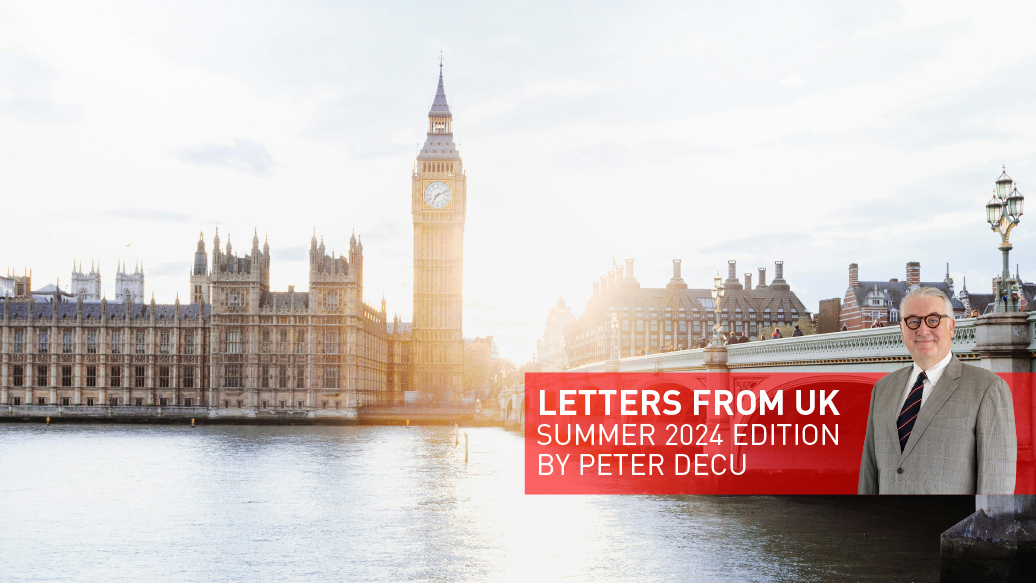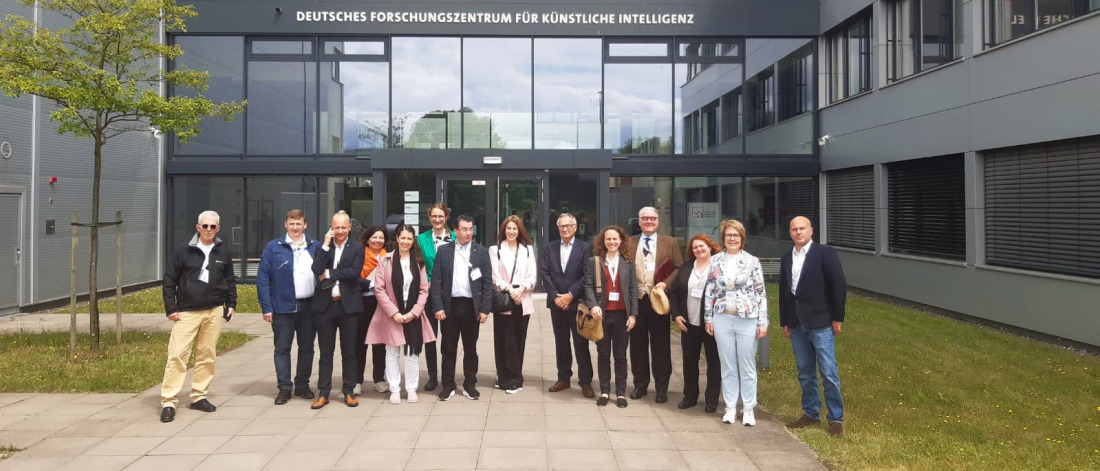Letters from the United Kingdom: What does the new government have to offer?
Letters from ...Facts and information about business and investments in the United Kingdom

Four years after Brexit and a few days after the general election, we are considering the business opportunities and current state of the economy in the United Kingdom. UK expert Peter Decu tells us what we need to know in our latest country report.
Peter Decu, Director of the Bremeninvest office of WFB Wirtschaftsförderung Bremen GmbH, reports directly from London, providing us with an overview of the trends, opportunities and new developments in the UK.
TCA, Windsor Framework and exports – new regulations and a new government

With a Labour government having just been elected in the United Kingdom (UK), many businesses are wondering how the economic relationship between the country and Europe will evolve.
After all, the past four years have been challenging for companies with a UK element to their business. The partners agreed to a new set of mutual trade arrangements through the EU–UK Trade and Cooperation Agreement (TCA) and the Windsor Framework affecting the Northern Ireland Protocol to lay a solid foundation for future trade relations. There may be an array of new goods controls, customs duties and regulations, but businesses can adapt. And indeed they have done. According to a recent study (German British Business Outlook (GBBO) by KPMG on behalf of the British Chamber of Commerce in Germany (BCCG)) the number of businesses feeling the negative impact of bureaucracy, customs duties and increased logistics costs has halved since 2021.
New agreements and contracts are also regularly coming into effect to further define the areas that still need to be defined in more detail. For example, the „Border Target Operating Model“ was implemented in January 2024 to introduce a new approach to importing animals, plants and plant products. The British government is having to revise and redraft thousands of laws altogether.
The uncertainty and aftermath of Brexit over the past few years has certainly left its mark on trade. Over the past eight years, the United Kingdom has slipped from 5th to 10th place in the list of Germany’s leading trade partners. The story is much the same across the EU. The value of goods imported into the UK from the EU has hit a record high, but the trade deficit has increased. The UK think tank „UK in a Changing Europe“ believes the record EU exports are the result of free trade agreements not being made quicky enough with the rest of the world, or at all. Following its exit from the European Economic Area, the UK has been forced to negotiate new free trade agreements to replace the EU terms that no longer apply to the nation. And so economic growth in the United Kingdom still lags behind many of the G7 countries, with individual sectors performing positively like the strong British service sector (banks/IT), which continues to grow at pace.
Trading companies are still ambivalent about the situation. According to the German British Business Outlook (GBBO), 52% of companies doing business in the UK/Germany have been negatively impacted since Brexit. And yet almost 40% still expect to see a slight or even significant upturn this year.
Will anything change now there is a new government in power? According to experts, the new government is expected to be more open-minded even if a drastic change in direction is not to be anticipated. Fundamentally changing agreements that have only just been put in place would be a long and drawn-out process. It would not be in anyone’s interests either, since it would entail even more years of uncertainty. The current agreements provide enough security to allow for long-term business plans to be made. The expectation instead is that the new government will make a number of minor tweaks and adopt a more open-minded approach to EU positions in general, such as when it comes to renegotiations or new bilateral agreements. British industry associations are calling for closer alignment with the EU, while GTAI expert Marc Lehnfeld has also argued that this works both ways.
Economic ties between the United Kingdom and Germany have not actually been as gloomy as summer in the UK for quite some time now – despite what many media reports would have us believe. The willingness of German businesses to invest in the UK increased recently. Between a third and half of the businesses surveyed for the KPMG study are seeing sales increasing in renewable energy and the energy sector. Around 60% are also expecting to see a slight or even significant increase in revenue on the whole in the next five years. In other words, it is well worth doing the research and identifying the most lucrative niches.
Wind power and hydrogen driving growth

There is no doubt that the energy sector is one of those niches. It is well-known that the United Kingdom’s long coastline makes it an ideal location for generating wind power. The country has a target to deploy 50 gigawatts by 2030 (compared to its current 15 GW). As it stands, it accounts for around 40% of the wind power capacity in Europe. Despite the excellent conditions, the past few years have been challenging for the UK wind industry. Industry representatives report that uncertainty, changes in political policies and excessive red tape have slowed down growth, with these challenges having been mirrored in Germany. There is also the added difficulty involved in finding enough qualified workers in a growing sector. Despite the challenges, the UK has stuck to its 2035 decarbonisation target and its 2050 net-zero target. The industry is expecting to receive even more support from the new government.
Steady progress in this area is not the only cause for optimism. There is plenty to be positive about in the hydrogen industry, too. It is set to grow in the UK, with the first projects already taking shape and an ambition to achieve 10 gigawatts of production capacity by 2030. The future is looking bright, with the North Sea set to become “Europe’s hydrogen plant” according to a GTAI report. The United Kingdom is expected to play a leading role as a net exporter, meaning it will be in a position to export more hydrogen than it consumes. With Germany in the opposite position, a lucrative trade opportunity presents itself. The first steps are already being taken. Alongside joint government statements, there is also a Scottish project advocating a “Hydrogen Backbone Link” – a pipeline between Scotland and northern Germany.
The plans are already further along in the electricity sector. In May 2024, work began to construct a new power line between England and Germany, with a view to making it easier to transport wind power to Europe.
Strengthening economic ties and exploring the hydrogen and AI markets on delegation trips

Delegation trips provide opportunities to move into a new market. That is why Bremeninvest has organised a series of market exploration trips between the United Kingdom and Bremen in recent years.
Most recently, seven British businesses headed to Bremen in June 2024 in the name of artificial intelligence. The itinerary included visits to businesses, such as Ubica, hmmh, Cellumation and OHB Digital, and institutes, such as the German Research Centre for Artificial Intelligence (DFKI). There was also a pitching evening as part of the 2024 Bremen AI Days, when initial feelers were put out to explore potential partnerships.
The delegation trip was organised as part of the programme for internationalisation for regions undergoing structural change (ISW). Germany Trade and Invest (GTAI) takes the lead on the programme under the German Federal Ministry for Economic Affairs and Climate Action (BMWK). The programme was delivered on the ground by Bremeninvest in partnership with the Senator for Economics, Harbours and Transformation. Looking to the future, plans are already underway for the next step. An application for the ISW outbound programme should open up the opportunity of a return visit to the UK, which will focus on renewable energy and hydrogen.
This would not be the first time a delegation from Bremen has visited the UK. There have been several trips to Scotland in the past with a focus on hydrogen, and the most recent being All-Energy 2024 in Glasgow. The aim was to make the most of the strengths of both locations in terms of renewable energy. A relationship founded on trust has been established in this case, too. Bremeninvest is acting in its capacity as part of HY-5, a hydrogen alliance of economic development organisations in the north of Germany.
Three questions for Peter Decu on the state of the UK economy

As a declared Anglophile and expert in international trade, Peter Decu represents the federal state of Bremen in the UK. His assessment of the current situation:
1) Mr. Decu, you talk to many companies in the UK. How does the business community currently perceive the situation regarding exports/imports to the EU?
I've done the math: Since 2021, I have visited 81 trade fairs and made 1,145 company contacts. There were only five Brexit supporters that I met, which surprised me a lot, because it doesn't even remotely resemble the referendum result. Due to the nature of the industry, it is mainly manufacturers in the F&B sector that are struggling with Brexit and there were a few that have stopped exporting to Europe. However, most have expressed that exporting to the EU has been made more difficult by Brexit, but that it is not "rocket science". It takes a little more time, effort and the costs have increased. But once you know what the new requirements are and how the procedure works, business continues as normal. At a logistics trade fair, the statements from freight forwarding companies were rather positive, as the more difficult requirements have increased customer loyalty due to Brexit.
2. Are there currently opportunities for German companies? How can they best take advantage of them?
Historically, Germany and the UK have always been good trading partners and there are still good opportunities and possibilities on both sides. Brexit is a hurdle, but not an insurmountable obstacle to continuing business contacts.
3. Your aim is to strengthen economic relations between Bremen and England and to attract companies from the UK to Bremen. What services and offers do companies need to ensure a positive economic exchange?
Due to its history as a port city, Bremen naturally has an extremely broad and very diverse portfolio for company relocations in Germany. As I haven't lived in Bremen myself for over 30 years, I am always very impressed when I see the highly developed state of not only the traditional industries, such as the automotive, food and beverage industries. But space travel, hydrogen and AI are also topics in which a lot is happening in Bremen and you can find many "hidden champions". The backbone is the excellent logistics expertise, which is important for many companies.
Bremen is not so well known in the UK today and a lot of development work needs to be done. When you visit Bremen with English entrepreneurs, everyone always feels surprisingly at home, because the chemistry of the North Germans suits the Anglophiles very well. Short distances, quick action and the friendly welcoming culture of the Hanseatic people do the rest to give everyone a very positive feeling about Bremen. I also believe that this is a core element of our services. We respond to companies individually and find tailor-made, pragmatic solutions for them.
Success Stories
Letters from Türkiye: Summer 2025 edition
Türkiye is focusing on high-tech innovation in order to achieve long-term growth. Will it succeed? Our Türkiye expert Erol Tüfekҫi explains in our country report.
Learn moreTake-off for Bremen: what makes the city a hub for aerospace expertise
The sky is not the limit. Science, production, development and business all agree on this. Aircraft wings, Ariane rockets, Galileo satellites - Bremen is one of the top locations in the international aerospace industry. Five reasons for Bremen's success story.
Learn moreLetters from Vietnam: Winter 2025 edition
What effects will the sweeping changes in the White House have on Vietnam's economy? Could the current administrative reforms have negative implications for foreign investors? These topics and more will be discussed in the latest Letter from Vietnam.
Learn more
